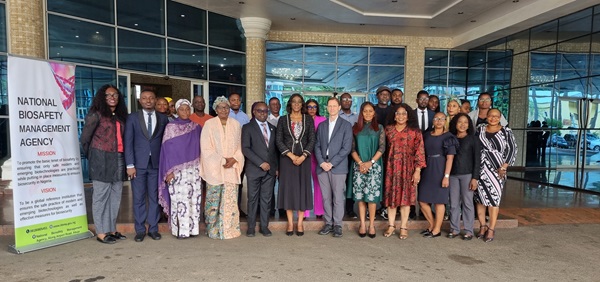
The National Biosafety Management Agency (NBMA) and the United States Department of Agriculture (USDA) recently conducted a one-day training workshop aimed at enhancing the capacity of journalists and social media influencers in Nigeria on the effective reportage of biosafety and biotechnology developments.
The workshop, held in Abuja, focused on equipping media professionals with the skills to accurately communicate complex biosafety issues, thereby promoting scientific literacy and countering non-science-based narratives surrounding agricultural biotechnology.
In her opening remarks at the workshop themed “Strategic Communication Training for Influencers/Reporters on Biosafety/Biotech Regulation,” NBMA director-general, Dr. Agnes Asagbra emphasised the importance of accurate and informed communication in biotechnology. She stated that the workshop was designed to empower media professionals and opinion influencers with the knowledge to effectively convey the benefits and regulatory frameworks associated with biotechnological products.
“This event has become crucial due to the significant misinformation and misinterpretation surrounding biotechnology. We recognised the need for a communication program tailored for journalists and influencers, and this initiative is jointly sponsored by NBMA and USDA,” Asagbra explained.
She also provided a background on the NBMA’s mandate, which includes establishing regulatory frameworks and safety measures for modern biotechnology and genetically modified organisms (GMOs) in Nigeria. Asagbra highlighted the agency’s vision to become a global reference institution for safe biotechnology practices and its mission to promote biosafety through robust biosecurity measures.
Addressing the issue of misinformation, Asagbra noted that myths and misconceptions have significantly clouded public understanding of GMOs. She stressed the need for journalists to be well-informed and committed to delivering accurate and unbiased information to the public.
In his remarks, Agricultural Counselor at the USDA Chris Bielecki lauded Nigeria’s leadership in developing and evaluating new crop varieties using modern agricultural biotechnology. He stated that the training aimed to enlighten participants on the science of agricultural biotechnology and the regulatory frameworks established by the NBMA to ensure the safe use and application of these technologies.
“The U.S. Diplomatic Mission in Nigeria is proud to partner with NBMA to organise this series of trainings. Our goal is to support Nigeria in advancing its agricultural biotechnology and biosafety regulations, which are critical for boosting food security, improving rural livelihoods and adapting to climate change,” Bielecki said.
He added that this was the second edition of the training, with the first held in Lagos two weeks prior. The feedback from that session was overwhelmingly positive, with participants reporting a significant increase in their scientific knowledge of biotechnology and a better understanding of the NBMA’s role in ensuring safety.
Bielecki also mentioned a national symposium organized in July by the USDA and the National Biotechnology Research and Development Agency. The symposium, titled “Sharing is Believing,” provided a platform for Nigerian agricultural biotechnology researchers and experts to share advances, discuss challenges, and debunk myths and misconceptions about the technology.
During the workshop, communication officer for West and Central Africa at the African Agricultural Technology Foundation (AATF) Alex Abutu emphasised the importance of journalists understanding the misconceptions surrounding biosafety and biotechnology. He urged them to focus on factual reporting and avoid biases when covering biotechnology topics.
Similarly, programme officer at the Open Forum on Agricultural Biotechnology (OFAB) Nigeria chapter Abraham Isah encouraged journalists to trust the work of scientists, particularly in the field of GM crops and animals. He highlighted that science is grounded in data and research and journalists should rely on the findings of scientists to inform their reporting.
“Evolving technologies such as biotechnology often face misconceptions due to personal interests. However, I urge journalists to trust in the work of scientists who conduct thorough research, as they are best positioned to provide accurate information,” Isah stated.
The workshop underscored the critical role of the media in shaping public understanding of biotechnology and the importance of informed, science-based reporting in dispelling myths and promoting the benefits of these technologies.


